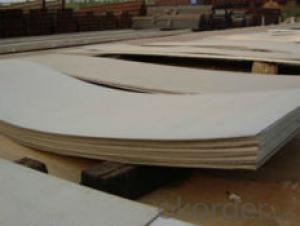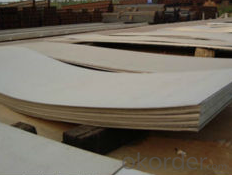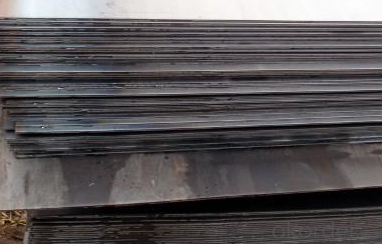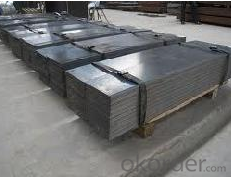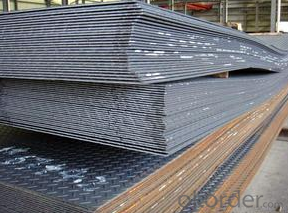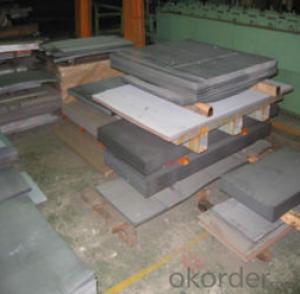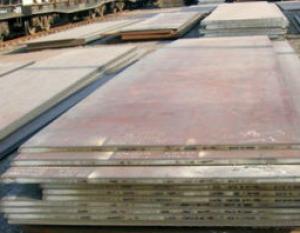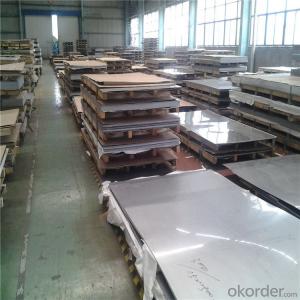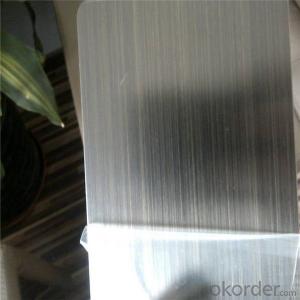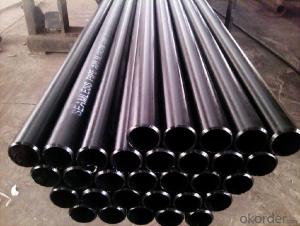316l Stainless Steel Sheet Price NO. 2 CNBM
- Loading Port:
- Qingdao
- Payment Terms:
- TT OR LC
- Min Order Qty:
- 10 pc
- Supply Capability:
- 30 pc/month
OKorder Service Pledge
OKorder Financial Service
You Might Also Like
Quick Details
| Grade: | 300 Series | Standard: | JIS, AISI, ASTM, GB, Other | Length: | 2000-6000mm |
| Thickness: | 0.3-80mm | Width: | 1000-2000mm | Place of Origin: | Zhejiang, China (Mainland) |
| Brand Name: | huaye | Model Number: | 316 | Type: | Plate |
| Application: | Foodstuff, Gas, metallurgy, biology, electron, chemical, petroleum, | Certification: | SGS |
Packaging & Delivery
| Packaging Details: | Standard export sea-worthy packing in wooden pallet. |
| Delivery Detail: | Normally 15-20 days |
Specifications
1)Surface: NO. 1, 2B, BA, NO. 3, NO. 4, HL, NO. 8 and so on.
2)Tickness: 0.3 to 4.0mm
3)Width: 31 to 1524mm
Specifications
1)Surface: NO. 1, 2B, BA, NO. 3, NO. 4, HL, NO. 8 and so on.
2)Tickness: 0.3 to 4.0mm
3)Width: 31 to 1524mm
4)Use: Decoation, industry etc.
About Products
1. We are a great agents of Chinese famous mills Baosteel, Tisco, Jisco, for S. S. Products, and some international famous mills POSCO, OUTOKUMPU.
2. Special dimension are acceptable.
3. Cutting & Slitting services are available.
4. Swift Lead time (usually about 20 days for ex-stock and processing).
5. Mill Inspection Certificate and Origin can be provided.
6. All material mentioned are in prime grades.
7. Coil weight: 05 to 20 tons(mainly).
8. We can supply materials with various surfaces(NO. 1, 2B, BA, NO. 3, NO. 4, HL, NO. 8)
Service Concept
The first customers become lifelong customers.
Others:
If you want to purchase some products to test the market, we can lower the MOQ
Delivery: Normally 15-20 days
Productivity: 5000-6000 tons/month
Packing: Standard export sea-worthy packing in wooden pallet
- Q: What is the role of steel pipes in the construction of bridges and tunnels?
- Steel pipes play a crucial role in the construction of bridges and tunnels. They are extensively used for various purposes due to their strength, durability, and versatility. In bridge construction, steel pipes are commonly employed for the fabrication of the bridge's structural framework. They serve as the primary load-bearing members, providing support and stability to the entire structure. Steel pipes are particularly favored in bridge construction due to their high tensile strength, which enables them to withstand heavy loads, including the weight of vehicles and the dynamic forces generated by traffic. Steel pipes are also utilized in the construction of bridge piers and abutments. These components provide the foundation and support for the bridge structure. Steel pipes are often driven deep into the ground to create sturdy foundations that can withstand the forces exerted by the bridge's weight and external factors such as wind, water currents, and seismic activity. Similarly, steel pipes are essential in tunnel construction. They are extensively used in tunnel lining, which refers to the installation of structural elements along the tunnel walls and roof to provide stability and prevent soil or rock collapse. Steel pipes are often used as reinforcement elements, ensuring the structural integrity of the tunnel and protecting it from external pressures. Moreover, steel pipes are employed for underground utility systems in both bridges and tunnels. They serve as conduits for various utilities such as water supply, electrical cables, gas pipelines, and communication lines. Steel pipes are ideal for these applications due to their corrosion resistance, ability to withstand high pressures, and longevity. Overall, the role of steel pipes in the construction of bridges and tunnels is to provide strength, stability, and durability to the structures. They play a vital role in ensuring the safety and functionality of these critical infrastructure projects, allowing for efficient transportation and the seamless provision of utilities.
- Q: Does seamless steel tube have a bend of 135 degrees?
- In engineering, it is usually marked as "45 elbow" and has no "135" mark. The angle of the elbow is acute, so there will be no more than 90 degrees elbow.
- Q: Are steel pipes suitable for semiconductor manufacturing plants?
- Yes, steel pipes are suitable for semiconductor manufacturing plants. Steel pipes are known for their durability, strength, and resistance to corrosion, making them an excellent choice for various industrial applications, including semiconductor manufacturing. In semiconductor manufacturing plants, various chemicals and gases are used throughout the production process. Steel pipes are highly resistant to corrosion and can withstand the harsh chemicals and gases commonly found in semiconductor manufacturing environments, ensuring the integrity and longevity of the piping system. Furthermore, steel pipes can handle high-pressure applications, which are often required in semiconductor manufacturing plants. They have excellent mechanical properties and can withstand heavy loads and stress, making them reliable for transporting fluids and gases at high pressures. Another advantage of steel pipes is their flexibility in terms of size and shape. Semiconductor manufacturing plants often require a complex and intricate piping system to accommodate different processes and equipment. Steel pipes can be easily customized and fabricated to fit specific requirements, allowing for efficient and seamless integration into the plant's infrastructure. Overall, steel pipes offer the necessary qualities and characteristics required for semiconductor manufacturing plants. Their durability, corrosion resistance, high-pressure capabilities, and flexibility make them a suitable choice for transporting chemicals and gases in this industry.
- Q: What are the different end types for steel pipes?
- There are several different end types for steel pipes, each serving a specific purpose. Some common end types include: 1. Plain End: This is the most basic type of end for steel pipes, where the pipe has no threading or any other special end treatment. Plain ends are typically used for non-threaded applications or when the pipe is intended to be welded. 2. Threaded End: Threaded ends have male threads on one or both ends of the pipe, allowing for easy connection with other threaded fittings or pipes. This type of end is commonly used in plumbing and gas applications where the pipe needs to be easily assembled or disassembled. 3. Beveled End: Beveled ends are cut at an angle, typically 30 or 45 degrees, to facilitate welding. The bevel creates a smooth transition between the pipe and the weld joint, ensuring a strong and secure connection. Beveled ends are commonly used in construction, oil and gas, and pipeline industries. 4. Coupling End: Coupling ends have female threads on both ends of the pipe, enabling two pipes to be joined together using a coupling or a fitting. This type of end is often used in plumbing systems or for connecting sections of pipes that need to be easily disassembled. 5. Flanged End: Flanged ends have a flared or raised lip on one or both ends of the pipe, allowing for easy attachment to other flanged components, such as valves or pumps. Flanged ends are commonly used in industrial applications where the pipe needs to be securely connected to other equipment. 6. Socket Weld End: Socket weld ends have a socket or recess on one or both ends of the pipe, allowing for easy connection with socket weld fittings. This type of end provides a strong and reliable joint, commonly used in high-pressure applications, such as petrochemical or power plants. These are just a few examples of the different end types for steel pipes. The choice of end type depends on the specific application requirements, such as the need for easy assembly, disassembly, or compatibility with other fittings.
- Q: How are steel pipes connected together?
- Steel pipes are typically connected together through various methods such as welding, threading, and flanging. Welding involves fusing the ends of pipes together using high heat, creating a strong and permanent connection. Threading involves screwing the ends of pipes together using threads, while flanging involves connecting pipes by flaring or bending their ends and securing them with bolts. These methods ensure a secure and reliable connection between steel pipes.
- Q: The difference between carbon and welded steel tubes
- Seamless steel pipe is made of Steel No. 10-20. It is of high quality carbon structural steelWelded steel pipe is usually welded by Q235 steel plate
- Q: What are the main types of steel pipe ah? How to judge which kind of steel pipe performance is better?
- Steel pipe according to the production method can be divided into two categories: seamless steel pipe and pipe joints, pipe joints as welded steel pipe.1. seamless steel tube according to the production methods can be divided into: hot-rolled seamless pipe, cold drawn tube, precision steel tube, heat expansion tube, cold spinning tube and extrusion tube.Seamless steel tubes are made of high quality carbon or alloy steel. They are hot-rolled and cold-rolled (drawn).Bundled steel pipe
- Q: Can steel pipes be used for nuclear power plants?
- Yes, steel pipes can be used for nuclear power plants. Steel pipes are commonly used for various applications in nuclear power plants, such as transporting coolant, steam, and other fluids. They are selected based on their ability to withstand high temperatures, pressures, and corrosive environments. However, specific requirements and regulations related to nuclear safety and radiation protection must be strictly followed during the design, fabrication, and installation of steel pipes in nuclear power plants.
- Q: Are steel pipes suitable for chemical processing plants?
- Due to their exceptional strength, durability, and corrosion resistance, steel pipes find common usage in chemical processing plants. Particularly, stainless steel or alloy steel pipes possess the ability to endure high temperatures, pressure, and the corrosive impact of various chemicals. Consequently, they serve as a suitable means for the safe and efficient transportation and containment of diverse chemical substances. Moreover, the installation, maintenance, and repair of steel pipes are hassle-free, rendering them a cost-effective option for chemical processing plants. Nonetheless, it remains crucial to carefully select the appropriate steel type, taking into account factors such as the specific chemicals being processed, operating conditions, and any potential risks or compatibility issues. Regular inspections and maintenance are also vital for ensuring the integrity and performance of steel pipes in chemical processing plants.
- Q: What is the maximum length of a steel pipe?
- The maximum length of a steel pipe can vary depending on various factors such as the manufacturing process, transportation constraints, and practical limitations. However, steel pipes can typically be manufactured and transported in lengths ranging from a few meters to several hundred meters.
Send your message to us
316l Stainless Steel Sheet Price NO. 2 CNBM
- Loading Port:
- Qingdao
- Payment Terms:
- TT OR LC
- Min Order Qty:
- 10 pc
- Supply Capability:
- 30 pc/month
OKorder Service Pledge
OKorder Financial Service
Similar products
Hot products
Hot Searches
Related keywords
